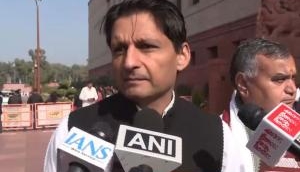
Pollution levels in the national capital shot up on Tuesday as wind speed dropped to zero, while fog disrupted rail services in the region.
According to the Centre-run SAFAR, air quality index (AQI) was docking at 314 in the morning which falls in the 'very poor' category.
At Dhirpur, the AQI was 315 while in Pitampura area it dipped to 'very poor' category at 337. Furthermore, AQI near Pusa Road, Airport Terminal 3 and Chandni Chowk stood at 272, 328 and 470, respectively.
AQI between the range of 51 to 100 is considered as satisfactory, 101-200 is moderate, 201-300 falls under the category of poor. 300-400 is considered as 'very poor' and range between 401-500 falls under the category as 'hazardous'.
Meanwhile, the Indian Railways said as many as 18 trains coming towards Delhi are running late due to low visibility on the railway tracks.
Overcast skies prevailed in Delhi with the minimum and maximum temperatures hovering at 9-degree celsius and 23 Degree Celsius, respectively. The relative humidity will be around 57 per cent for the entire day, according to the India Meteorological Department
The organisation has further predicted cloudy skies across the capital on Wednesday with minimum and maximum temperatures hovering at 9 Degree Celsius and 24 Degree Celsius.
SAFAR in its advisory has stated that Delhiites must avoid prolonged or heavy exertion.
As per a UNICEF report titled Clean the air with children, the experts have found that the increasing menace of air pollution causes miscarriages, early delivery and, low birth weight. It also contributes to diseases that account for almost 1 in 10 of all deaths of children under the age of five.
The organisation also stated that it can harm the healthy development of children's brains and can also drag on economies and societies, already costing as much as 0.3 per cent of global GDP- and rising.
"Children breathe twice as quickly as adults and take in more air relative to their body weight. the respiratory tracks are more permeable and thus more vulnerable. Their immune systems are weaker. Their brains are still developing," the UNICEF report read.
-ANI







![BJP's Kapil Mishra recreates Shankar Mahadevan’s ‘Breathless’ song to highlight Delhi pollution [WATCH] BJP's Kapil Mishra recreates Shankar Mahadevan’s ‘Breathless’ song to highlight Delhi pollution [WATCH]](https://images.catchnews.com/upload/2022/11/03/kapil-mishra_240884_300x172.png)

![Anupam Kher shares pictures of his toned body on 67th birthday [MUST SEE] Anupam Kher shares pictures of his toned body on 67th birthday [MUST SEE]](https://images.catchnews.com/upload/2022/03/07/Anupam_kher_231145_300x172.jpg)






